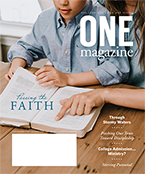
December 2020- January 2021
Passing the Faith
------------------
|





Teaching the Young to Adult
By Sarah Bracey
It was a beautiful, spring day. I was driving home from a friend’s house when my car started to jerk and sputter, eventually rolling to a stop on the roadside. Sitting there, I did what I had always done when a car decided to give up on life: I called my dad. “Hey, Dad, it’s me! Well, it’s happened again. Do you think you can come down and look at my car?”
I had always leaned on my father when it came to car troubles. When I was first learning to drive, I had some real lemons, so getting stuck on the side of the road became a regular, frustrating occurrence. Fortunately, I was usually not too far from home when the clunker reached its final destination, and I could always count on my dad to come to my rescue.
This time, though, was different. I wasn’t just down the road. Two months earlier, I had exerted some of my first-born independence and moved to Nashville (two states away). I was hoping to make a new start in my young, adult life.
On the phone, my dad let out a heavy sigh followed by a long pause. Then he finally handed me a bitter pill to swallow: “Not this time. Look, you’re going to have to figure this one out on your own. It’s time for you to learn how to take care of yourself.”
My mind began to race. Take care of myself? How could he do this to me? Didn’t he love me? The first of many tears began to sting my eyes as I yelled into the phone something incomprehensible before hanging up and slumping down into the gravel. I was on my own.
While I was incredibly hurt and angry at my dad, I slowly began to appreciate this life lesson over the following months and years. As young people, we desire independence, but on our terms. I wanted rescue when my independence got me into trouble. How alike we are to the Children of Israel.
Godly Discipleship
In the book of Exodus, the people of Israel groaned during their enslavement, and it reached the ears of God (Exodus 2:23). God had assured them of their escape, but they became convinced Moses led them to the wilderness to die once they turned to see Pharaoh’s army pursuing them (Exodus 14:10-12). Often, we as humans desire freedom, but we question our leaders and mentors when the pursuit of freedom brings hardship, believing our discipline is cruel punishment.
As children, we may think of discipline as simply the response to wrongdoing or punishment. We have a disadvantage because our view is limited. We are incapable of seeing how discipline is the loving, temporary act of a patient parent who sees beyond the immediate circumstances. Our mentors see much further down the road we are traveling and, therefore, can provide course corrections where needed.
Paul’s discipleship of Timothy is one of the greatest examples in the New Testament for how to guide and teach the young in faith. Paul gave Timothy encouragement and showed his appreciation for his work (2 Timothy 1), but he also gave Timothy some difficult instructions to follow (Acts 16:3). Interestingly, we never see Timothy complain of Paul’s treatment. Paul knew how to be a good mentor, but Timothy was also an excellent mentee.
Offering Help Rather Than Rescue
Being a disciple also means allowing our mentors into our lives and places of struggle. The day after my car broke down, I was sharing the story with my Sunday School class. The teacher, who had two grown daughters of his own, spoke with his wife, and the two of them agreed to help me. They offered to give me a ride to work in the mornings while I was waiting for my car to be
repaired, provided I could find a way home (back when Uber and Lyft were not available).
While a part of me (pride) did not want to share my struggles with others, I admitted I could use a little help. Parents and mentors take a risk in their discipleship. Eating solid food (1 Corinthians 3:1-2) may cause you to believe you no longer depend on the provider. Independence can be the illusion of self-reliance, the misconception we don’t need others, which perpetuates the lie we don’t need God.
Many of us fall into the cultural trap that adulthood is about self-reliance. This concept cannot be further from the truth for believers. Rather, we should desire and depend on God’s discipline. The author of Hebrews describes the discipline we receive from our earthly fathers, and we respect them for it (Hebrews 12:9). However, when God disciplines His children, He does so that we may share in His holiness, even if it seems painful and unpleasant. “But later it yields the peaceful fruit of righteousness to those who have been trained by it” (Hebrews 12:11b).
I was very appreciative of my teachers’ help in picking me up and driving me into Nashville every morning. While it was well within their means to pay for car repairs or a taxi, they gave their time each day to disciple me further. They helped rather than rescued. If they had paid for the repairs, I would not have learned anything, and I would not have learned the responsibility that comes with owning a car. I would have been dependent on another couple to rescue me during breakdowns. Had I refused the help, I would have missed out on the opportunity of their discipleship.
The only true rescue we ever need is from sin, and no one can rescue us except Jesus Christ. Spiritual maturity, through discipleship, teaches us just how lost and dependent we are without Christ. The tow truck and consequent repairs did not come cheap. I lived on peanut butter sandwiches and Ramen™ noodles for awhile, but that harsh lesson at 24 years old shaped me into the more responsible adult I am today.
God’s discipleship through the mentors in our lives may hurt sometimes, but it is similar to the loving hand of a parent disciplining his or her child. While discipleship may include the discipline of my father, it also includes the help of the Sunday School couple: two forms of discipleship, both needed in the nurture and admonition of the Lord (Ephesians 6:4).
About the Writer: Sarah Bracey is the Psychology Program Coordinator and Campus Counselor at Welch College. She earned her PhD in Counselor Education and Supervision from the University of the Cumberlands and is a Licensed Professional Counselor in Tennessee. She attends Sylvan Park Church in Nashville and lives in Mount Juliet with her husband, Matthew, and their cat, Puzzles.
|
|

